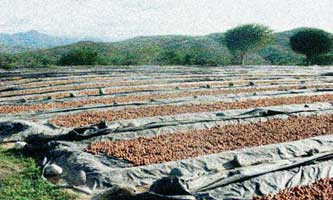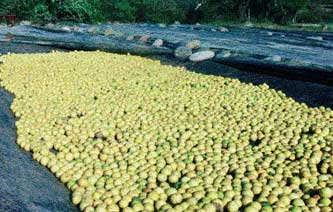Natural dehydration of lemons
What problem does it solve?
Natural dehydrated lemons represent a sustainable environmental answer to the problem of generating income and work in semiarid and marginal zones, where it is hard to find other productive agricultural options.
The successful history of the COELMON cooperative started in the early 1990s, when the community of Marajuma, in the municipality of Morazán (Department of Progreso) went through an unprecedented economic crisis. Extreme poverty, malnutrition, lack of resources and unemployment affected the settlers so seriously that it was decided to find alternative forms of economic development. The proposal was to exploit the potential for producing lemons and tackle the price crisis by processing and commercialising lemons.
Lack of investment results in:
• High poverty levels
• Few job opportunities in rural areas
• Low income levels in semiarid zones
• Environment deterioration, due especially to deforestation and disappearance of thorn woods
• Surplus of fresh product in times of market saturation
• Weak community organisation
• Poorly developed agricultural production chains
• Limited market access
Positive aspects to be gained through the adoption of this process can be listed as follows.
ENVIRONMENT
• Reforestation through planting of trees
• Establishment of fruit tree nurseries (grafting Citrus Aurantifolia L. on either macrofilia or volkameriana root stock).
• Non polluting drying process
ECONOMIC AND SOCIAL ASPECTS
• Generation of employment with no need for high levels of specialisation
• Strengthening of community organisation in terms of production
• Steady and seasonal work for producers, pickers and, transport workers, etc.
LOCAL DEVELOPMENT
• Exploitation of local resources
• Development of local workforce
• Extension of production chains from the local level upwards
• Prospects for increased productivity
• Technological innovation
• Gradual upgrading of product quality
• Standardisation of supply and improvement in producers’ bargaining capacity
• Low cost locally available technical assistance
The experience of drying lemons in Guatemala demonstrates that, despite adverse natural conditions, lack of services and high poverty levels, quality production processes can be developed and directed at the international market.
The drying process has no negative effect on the environment, since the techniques used do not pollute and are based on locally developed experiences.
Equally environmentally friendly are the modern sun dehydrators which some producers use to speed up production, but which do not affect product quality (COELMON has already conducted several trials). 
The process of producing, dehydrating and exporting lemons represents an innovative experience that has led to the introduction of suitable technology, larger production chains, promotion of exports, ecologically sustainable processes, and exploitation of local resources.
Experiences in Guatemala show that the dehydration process can be adopted by producer organisations in marginal rural zones, as long as there is plenty of sunshine and low relative humidity.
Ideally, temperatures should range between 28 and 40 degrees centigrade, which will help the drying process and prevent damage from humidity: rainfall should not exceed 500 millimetres a year.
The dried product does not require much investment in infrastructure and equipment, and can easily be replicated in economically disadvantaged parts of the world.








 COUNTRY OF ORIGIN
COUNTRY OF ORIGIN